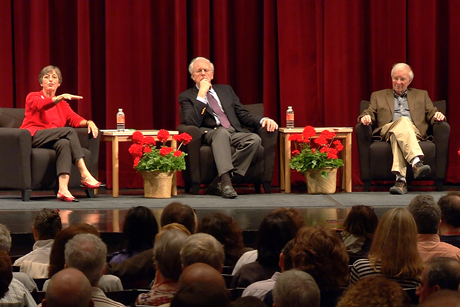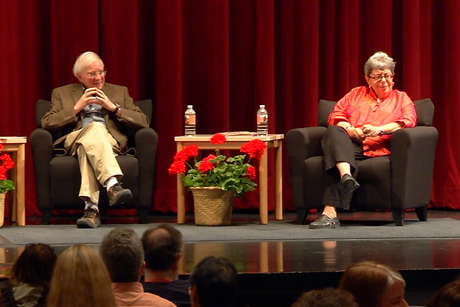Faculty members discuss evolution of teaching
By Bill Steele

The world has changed a lot since the ’60s, and so have Cornell students. They are more diverse, more dedicated, more apprehensive, maybe even more “salacious,” according to a panel of history faculty who recounted some of their own teaching history to a Reunion 2013 audience in Bailey Hall June 7.
The Class of 1973 Forum: “The Evolution of Teaching at Cornell: A Discussion of Changes from the Sixties to the Future,” featured Richard Polenberg, the Marie Underhill Noll Professor Emeritus of History; Walter LaFeber, the Andrew H. and James S. Tisch Distinguished University History Professor Emeritus; and Joan Jacobs Brumberg, professor emerita of history, human development and gender studies. All three are Stephen H. Weiss Presidential Teaching Fellows.
Susan Murphy, vice president for student and academic services, moderated the panel, opening by pointing out that since the Class of ’73 was here, “Bailey Hall has changed, and so has the world.”
LaFeber sketched the changes in the world. “When your folks were born,” he told the mostly mature audience filling the front half of Bailey’s downstairs, “the United States was one of just two great powers in the world.” But today, he said, there are many more competitors, and the competition is more about economic power than military strength.
Polenberg recalled that when he arrived at Cornell in 1966 the faculty met at formal dinner parties where you wore a tie, and after dinner men and women gathered in separate rooms. Students could depend on finding good jobs, and those going on to graduate study only applied to two or three schools. Today’s students, he said, are “exceedingly worried” about their futures.

Brumberg, proudly proclaiming that she had been an “affirmative action hire,” said she was there to provide the women’s perspective, and recounted the many changes she had seen in female students: There are a lot more of them, they are more ambitious and competitive, more active sexually – and more open about it – and have much wider career choices. In choosing what to do after graduation they no longer “wait to see what the boyfriend will do,” she noted. A young woman pre-med today would be insulted if you asked her, “Have you thought about nursing?” she said. A downside, she added, is that fewer smart women go into teaching, and this has lowered the quality of public school teachers.
How all this has affected the evolution of teaching was never really addressed, but a question-and-answer period raised issues about technology, including MOOCs (Massive Open Online Courses), which have not yet penetrated the history department. Since the advent of the Internet, LaFeber lamented, fewer students meet personally with faculty members in their offices, meaning there is less opportunity to mentor them in matters beyond the course itself, and less opportunity to develop lasting friendships.
All this will evolve as the next generation moves up, Brumberg said. “Younger people think digitally,” she concluded.
The panel was recorded and will be available for viewing on CornellCast.
Media Contact
Get Cornell news delivered right to your inbox.
Subscribe